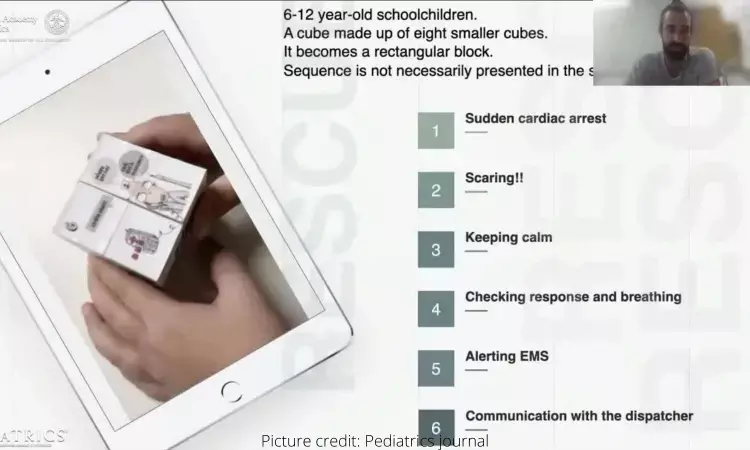- Home
- Medical news & Guidelines
- Anesthesiology
- Cardiology and CTVS
- Critical Care
- Dentistry
- Dermatology
- Diabetes and Endocrinology
- ENT
- Gastroenterology
- Medicine
- Nephrology
- Neurology
- Obstretics-Gynaecology
- Oncology
- Ophthalmology
- Orthopaedics
- Pediatrics-Neonatology
- Psychiatry
- Pulmonology
- Radiology
- Surgery
- Urology
- Laboratory Medicine
- Diet
- Nursing
- Paramedical
- Physiotherapy
- Health news
- Fact Check
- Bone Health Fact Check
- Brain Health Fact Check
- Cancer Related Fact Check
- Child Care Fact Check
- Dental and oral health fact check
- Diabetes and metabolic health fact check
- Diet and Nutrition Fact Check
- Eye and ENT Care Fact Check
- Fitness fact check
- Gut health fact check
- Heart health fact check
- Kidney health fact check
- Medical education fact check
- Men's health fact check
- Respiratory fact check
- Skin and hair care fact check
- Vaccine and Immunization fact check
- Women's health fact check
- AYUSH
- State News
- Andaman and Nicobar Islands
- Andhra Pradesh
- Arunachal Pradesh
- Assam
- Bihar
- Chandigarh
- Chattisgarh
- Dadra and Nagar Haveli
- Daman and Diu
- Delhi
- Goa
- Gujarat
- Haryana
- Himachal Pradesh
- Jammu & Kashmir
- Jharkhand
- Karnataka
- Kerala
- Ladakh
- Lakshadweep
- Madhya Pradesh
- Maharashtra
- Manipur
- Meghalaya
- Mizoram
- Nagaland
- Odisha
- Puducherry
- Punjab
- Rajasthan
- Sikkim
- Tamil Nadu
- Telangana
- Tripura
- Uttar Pradesh
- Uttrakhand
- West Bengal
- Medical Education
- Industry
Use of educational toys improves basic life support education in school children: Study

Spain: A recent study has shown that the use of specific didactic material with images forcing hands-on activity is more effective in teaching basic life support (BLS) skills to school children than a cuddly toy or manikin. The study is published in Pediatrics, the official journal of the American Academy of Pediatrics.
Including basic life support training in the school curriculum with the support of other community strategies are highly correlated to an increase in bystander cardiopulmonary resuscitation. Therefore, many schools in different parts of the world have implemented CPR education in the last decade. Cristina Varela-Casal, REMOSS Research Group, Faculty of Education and Sport Sciences, University of Vigo, Vigo, Spain, and colleagues aimed to compare traditional basic life support education with specific and innovative educative didactic material that has been previously designed and validated.
The study included 15 classes of schoolchildren aged 5 to 8 years (n = 237). They were randomly assigned to o 4 groups in which different didactic and complementary materials were used: (1) the Rescube tool with a cuddly toy (n = 61), (2) the Endless Book tool with a cuddly toy (n = 74), (3) traditional teaching with a cuddly toy (n = 46), and (4) traditional teaching with a manikin (n = 55).
Varela-Casal and the team then assessed BLS sequence at baseline (T0). Following this, children took part in a one-hour theory and practice session in their assigned training modality. BLS sequence was assessed again within one week (T1) and after one month (T2).
The research yielded the following findings:
- The 4 modalities were successful in improving children's skills when comparing T0 with both T1 and T2.
- At T2, more schoolchildren remembered the complete BLS sequence after using the Rescube (75%) compared with the number of schoolchildren who remember the complete BLS sequence after using the Endless Book (53%), a manikin (42%), or a cuddly toy (13%).
- A higher proportion of participants who used the Rescube correctly performed all the BLS steps analyzed compared with those who used only the manikin or a cuddly toy during the learning phase.
- The Endless Book was also more effective except for learning to check consciousness and breathing.
The researchers concluded, "using specific and adapted didactic materials (Rescube and Endless Book) led to better achievement of BLS learning and knowledge retention outcomes." They added that these new educational tools have the potential to substantially support BLS school education programs.
Reference:
The study titled, "Teaching Basic Life Support to 5- to 8-Year-Old Children: A Cluster Randomized Trial," is published in the journal Pediatrics.
DOI: https://pediatrics.aappublications.org/content/early/2021/09/11/peds.2021-051408
Dr Kamal Kant Kohli-MBBS, DTCD- a chest specialist with more than 30 years of practice and a flair for writing clinical articles, Dr Kamal Kant Kohli joined Medical Dialogues as a Chief Editor of Medical News. Besides writing articles, as an editor, he proofreads and verifies all the medical content published on Medical Dialogues including those coming from journals, studies,medical conferences,guidelines etc. Email: drkohli@medicaldialogues.in. Contact no. 011-43720751


